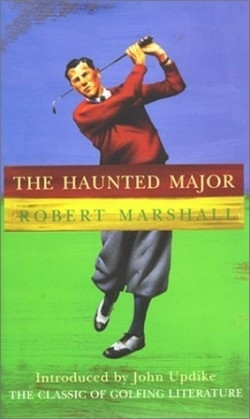
The Haunted Major
“I am a popular man,” Jacky Gore greets one in this deliciously humorous short novel, published in Britain in 1902 but only now in the United States, “and withal I am not vain.”
Why, certainly not. It is hardly the fault of Major, the Honourable John William Wentworth Gore, 1st Royal Light Hussars, son of one of England’s oldest earls and grandson of one of its newest marquises, that, in addition to being a highly talented painter, gifted musician and literary connoisseur, he is also “the finest sportsman living.” And it is simple modesty, which is but “an accurate valuation of one’s own worth,” that further compels the Major to mention his unsurpassed excellence at polo, cricket, rugby and hunting, not to mention his expeditions to the Arctic, mountain climbing, yachting, shipwreck diving and balloon voyages, nor his uncanny knack for billiards, whist, piquet and poker. “… I have not confined my talents, such as they are, to any one particular branch of sport.” And the world is undoubtedly the better for it.
What more could such a man need? Comeuppance, for one thing. And the Major is about to get his, courtesy of two sources with demonstrated prowess at humbling the most arrogant of men. One is, of course, a woman. The other is golf.
The Major’s plan to propose to millionaire widow Katherine Clavering Gunter at a dinner party is derailed by the unexpected presence of Jim Lindsay, “the finest golfer living,” with whom Katherine appears infatuated. Now, Jacky Gore despises golf as unmanly and has never tried it. But with the fair lady’s affections at stake, he challenges Lindsay to a head-to-head matchup in Scotland one week hence—plenty of time, he reasons, to master such a mediocre sport.
Is richly deserved humiliation in store? Perhaps. But as Updike notes in his introduction, golf is “a spooky game.” Enter the ghost of Cardinal Smeaton, a long-dead Scotsman with a Reformation-era axe to grind, offering the Major a chance at pulling off the equivalent of a country-club hacker upsetting Tiger Woods. Can the prideful Gore bring himself to accept the Cardinal’s otherworldly intervention? If so, will it be enough against such towering odds?
Marshall, a turn-of-the-century playwright and novelist, spins a delightfully satirical yarn made all the more enjoyable by Updike’s erudite yet lively essay, which supplies the modern reader with historical context. The tale will resonate with anyone who has endured the maddening vicissitudes of golf—perhaps even to the point that, as Updike writes, “by the end, boastful cad though (Gore) is, we are rooting for him.”
Reviewed by
John Flesher
Disclosure: This article is not an endorsement, but a review. The publisher of this book provided free copies of the book to have their book reviewed by a professional reviewer. No fee was paid by the publisher for this review. Foreword Reviews only recommends books that we love. Foreword Magazine, Inc. is disclosing this in accordance with the Federal Trade Commission’s 16 CFR, Part 255.
